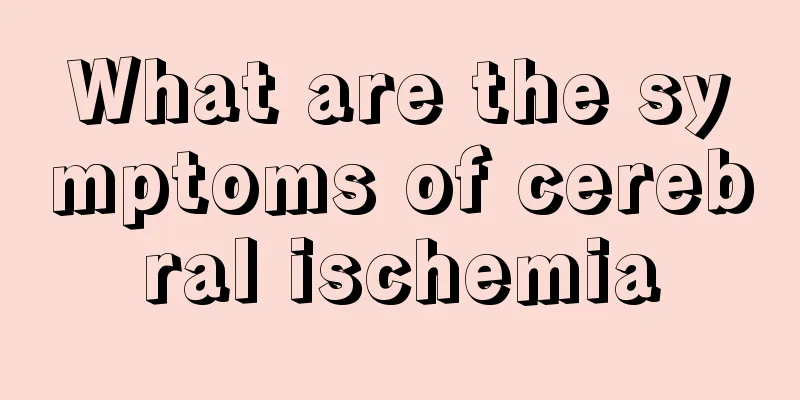What are the symptoms of cerebral ischemia

|
Cerebral ischemia is a relatively common acute cerebrovascular disease, commonly known as "mini-stroke". Generally, patients will suddenly become ill, and if treated promptly, they can recover within 24 hours. However, the disease will recur, often putting patients and their families in a tense atmosphere, and placing a heavy burden on both patients and their families. Symptoms of cerebral ischemia include the following: 1. Acute cerebral ischemia Sudden, transient, focal neurological deficits that resolve within 24 hours without sequelae; The main symptoms of focal neurological deficits are: (1) Hemiplegia, hemiplegia, decreased sensation, visual impairment, and bulbar palsy; (2) Dizziness, headache, tinnitus, black spots in front of the eyes, facial numbness, weakness in the limbs, coughing when drinking water, and slurred speech. Many of the above symptoms may last for a few minutes or hours before completely returning to normal. In a few patients, they may last for more than ten hours, but all return to normal within 24 hours. 2. Recurrent cerebral ischemia symptoms Repeated attacks of dizziness, heaviness, headache, irritability, tinnitus, Insomnia, dreaminess, memory loss, lack of concentration, forgetfulness (such as not being able to remember recent events), etc. Situation occurs. 3. The age of onset is mostly over 50 years old, with a history of heart disease and atherosclerosis. Transient ischemic attack, abbreviated as TIA, is also called transient ischemic attack or mini-stroke. It refers to brain dysfunction caused by a decrease in cerebral blood flow in a short period of time. Each attack lasts for a short time, usually a few seconds, minutes or hours, and no longer than 24 hours. It is often overlooked because the symptoms come and go quickly, and leave no sequelae after recovery. In fact, although the symptoms of TIA are mild, the consequences are serious. If not treated in time, according to statistics, about 25% to 40% of patients will suffer from severe cerebral infarction within 5 years, threatening the patient's life. Therefore, medical scientists often regard it as a precursor or danger signal of cerebrovascular disease. |
<<: Three-minute tips to relieve headaches
>>: What are the symptoms of Helicobacter pylori gastritis
Recommend
What is the stage of gastric cancer? How to treat it? How long can you survive
Clinically, cancer is generally divided into four...
What are the best treatments for colds
Every time when the seasons change, the temperatu...
What are the early diagnosis methods for liver cancer? Reveal three nursing methods for liver cancer
Everyone knows that the mortality and incidence r...
How long can a person with malignant nasopharyngeal cancer live without treatment?
Nasopharyngeal carcinoma is a serious malignant t...
Can people with gastroenteritis eat oranges?
Orange is a fruit that tastes sour and sweet. It ...
Can malignant chondrosarcoma be cured?
Malignant chondrosarcoma is a rare malignant tumo...
What happens if urticaria is scratched
Urticaria is a common skin disease. It is contagi...
What flowers should I grow at home to prevent mosquitoes
Usually, many people like to buy some flowers and...
How to make nails grow quickly
Nowadays, many girls who love beauty will choose ...
How to perform ovarian cancer staging surgery? How to provide postoperative care for ovarian cancer
Ovarian cancer staging surgery first requires a s...
How much does it cost to treat lymphoma
Lymphoma brings a lot of harm to everyone in real...
What to do if you keep coughing
Many patients' coughs are caused by lung infl...
What are the symptoms of advanced gallbladder cancer?
Gallbladder cancer is a very familiar disease ter...
What is the cause of lymphoma
Lymphoma may not be well known to everyone. Exper...
What diseases does the cervical cancer vaccine prevent
Cervical cancer vaccines mainly prevent human pap...









